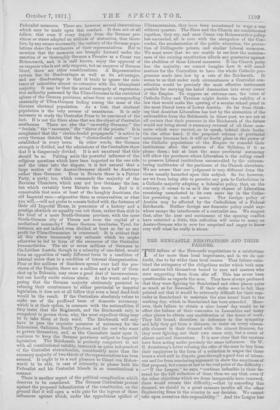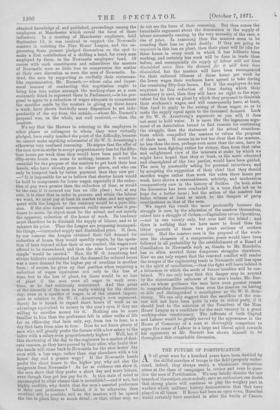THE NEWCASTLE NEGOTIATIONS AND THEIR FAILURE.
THE failure of the Newcastle negotiations is a misfortune of far more than local importance, and is, we do not doubt, due to far wider than local causes. That failure exhi- bited the stringency of the obligations under which both men and masters felt themselves bound to men and masters who were supporting them from afar off. This has never been questionable as regards the men. They have always professed that they were fighting for Sunderland and other places quite as much as for Newcastle. If their strike were to fail, they pointed out that it would be extremely difficult for their com- rades in Sunderland to maintain the nine hours' limit to the working day, which in Sunderland has been conceded. More- over, their failure to obtain a nine hours' day would be in. effect the failure of their comrades in Lancashire and many other places to obtain any modification of the hours of work. They felt bound, therefore, in deference to the sympathy and help they get from a distance, to insist on every reason- able element in their demand with the utmost firmness, for they were fighting, not their own cause only, but a cause of almost national dimensions. It is now clear that the masters have been acting under precisely the same influences. Sir W. G. Armstrong's letter refusing the offer of the men to buy from their employers in the form of a reduction in wages the three hours a week still in dispute, goes through a good deal of labori- ous and far from convincing argument to show the emptiness of that proposal, but comes at last to tho real point of the difficulty : —" If the League," he says, "continue inflexible in their de- mand for the full reduction of time, then we say that, even if the other objections which we deem insuperable were removed, there would remain this difficulty,—that by conceding this demand, we should in a great measure involve all_ the other Engineering firms in the country in our decision. We cannot take upon ourselves this responsibility." And the League has
obtained knowledge of, and published, proceedings among the employers at Manchester which reveal the force of these influences, In a meeting of Manchester employers, held September 12, it was resolved to support the Newcastle masters in resisting the Nine Hours' League, and the en- gineering firms present pledged themselves on the spot to make a first contribution of a shilling a head, for every man employed by them, to the Newcastle employers' fund. Of course with such constituents and subscribers the masters of Newcastle were as little free to compromise the matter at their own discretion as were the men of Newcastle. In- deed, the men by supporting so cordially their statesman-
like representative, Mr. Burnett, whose calm and imper- sonal manner of conducting this negotiation ought to bring him into notice amongst the working-class as a man eminently fitted to represent them in Parliament,—in his pro- posal to agree to a reduction of wages adequate to compensate the sacrifice made by the masters in giving up three hours a week, have shown decidedly more disposition to act inde- pendently of the cry from the outside,—where Mr. Burnett's proposal was, on the whole, not well received, — than the masters.
We say that the Masters in referring to the employers in ether places as colleagues to whom they were virtually pledged, have really touched the point of the difficulty, because we cannot make anything substantial of Sir W. G. Armstrong's .otherwise very confused reasoning. He argues that the offer of the men now on strike to accept proportionately less for the fifty- lour hours per week than they would have been paid for the fifty-seven hours can come to nothing, because it would be essential for the purpose of the masters to get back their best hands, who have already gone to other places, and who can • only be tempted back by better payment than they now get : —" It is impossible for us to believe that shorter hours would be held to compensate for lower wages, especially if the reduc- tion of pay were greater than the reduction of time, as would be the case if it covered our loss on idle plant ; but, at any rate, it is clear that in order to procure and retain the labour we want, we must pay at least its market value, and any agree- ment with the League to the contrary would be a pure illu- sion. If the nine hours' movement really means what it pro- fesses to mean, its object must be the actual, and not merely the apparent, reduction of the hours of work. Its tendency must therefore be to diminish the supply of labour, and so to enhance its price. Thus the League are proposing incompati- ble things,—contracted supply and diminished price. If, then, by our consent the League obtained their full demand for reduction of hours, they would speedily regain, by the opera- tion of laws beyond either their or our control, the wages now offered to be surrendered, and thus the nine hours pure and simple' would be carried." Now, Sir W. G. Armstrong had always hitherto maintained that the demand for reduced hours was a mere demand for the higher pay of overtime in another form ; of course, he gives up that position when requiring a reduction of wages equivalent not only to the lose of time, but to the loss of plant, for there would be no loss of plant if the men were all eager to work over- time, as he had sedulously maintained. And this point of the sincerity of the men in really wishing for the shorter day, even at a sacrifice of wages, is of the utmost import- ance in relation to Sir W. G. Armstrong's new argument.
Surely he is bound to regard short hours of work as an advantage equivalent to money in the men's eyes, if they are willing to sacrifice money for it. Nothing can be more familiar to him than the preference felt in other walks of life for an office-day that lasts only, say, from ten to four, to a day that lasts from nine to four. Does he not know plenty of men who will greatly prefer the former with a low salary to the latter with a salary even proportionately higher ? Well, but if this shortening of the day to the engineers be a matter of first- rate concern, as they have proved by their offer, why doubt that 'the hands will come back to Newcastle for the nine hours day even with a less wage, rather than stay elsewhere with a ten hours' day and a greater wage ? If the Newcastle hands prefer the short hours to the higher pay, why not also the emigrants from Newcastle ? As far as evidence can show it, the men show that they prefer a short day and more leisure, even though they get less pay for it. Is this state of mind so unexampled in other classes that is incredible?—and if not, but highly credible, why doubt that the men's asserted preference is their real preference ? Indeed, if it be otherwise, then overtime will be possible, and so the masters will be spared the loss in plant they so much dread ; so that, either way, we do not see the force of their reasoning. But then comes the formidable argument about the diminution in the supply of labour necessarily causing, by the very necessity of the case, a rise of price. In reasoning thus the masters seem to be counting their loss on plant doubly. If they are going to acquiesce in this loss on plant, then their plant will lie idle for three hours in every week in which it has hitherto been working, and certainly less work will be done in trade than before, and consequently the supply of labour will not have diminished more than the demand for it will have been diminished, but the masters will have been recompensed for their enforced idleness of three hours per week by the lower wages their workmen have agreed to take during the remaining fifty-four hours. But if the employers do not acquiesce in this reduction of time during which their machinery is used, then they will have no right to the equi- valent for the loss on plant by which they proposed to diminish their workmen's wages, and will consequently have, at least, that fund to apply to the raising of those wages, so as to make the supply equal again to the increased demand. Look at Sir W. G. Armstrong's argument as you will, it does not seem to hold water. It is more like the ingenious argu- ment of an Association bound to find reasons for continuing the struggle, than the statement of the actual considera- tions which compelled the masters to refuse the proposal of their men. It seems to us but too clear that the masters, no less than the men, perhaps even more than the men, have in this case been fighting rather for victory, than from that calm and enlightened view of the interests at stake by which we might have hoped that they at least, as the more educated and clearsighted of the two parties, would have been guided. The men by constantly asking for personal interviews, and by accepting the suggestion of their chief that they should sacrifice wages rather than work the extra three hours per week, have shown a reasonableness, sobriety, and moderation comparatively rare in the history of Strikes. On both sides the discussion has been conducted in a tone that led us to hope for a better issue ; but the action of the masters has borne witness at least as much to the dangers of party combinations as that of the men.
We regret the result the more profoundly because the struggle is now, by the admission of the masters themselves, raised into a struggle of Orders,—Capitalists versus Operatives, —not in one county only, but over half the island ; and there is nothing that we have more to dread than the bitter quarrels of these two great sections of modern society. Had the masters seen in the proposal of the work- men the elements of a compromise, peace would have been followed in all probability by the establishment of a Board of Conciliation in Newcastle such as, thanks to Mr. Mundella, has so often averted these dangerous struggles elsewhere. Now we can only expect that the renewed conflict will render the temper of the engineering trade in Newcastle still less open to the spirit of conciliation,—that the fight will leave behind it a bitterness in which the seeds of future troubles will be con- tained. We can only hope that this danger may be averted by the statesmanlike calmness of the men's leader, Mr. Bur- nett, on whose guidance the men have even greater reason to congratulate themselves, than even the masters on having so able and distinguished a mouthpiece as Sir W. G. Arm- strong. We can only suggest that the sacrifices of the con- test will not have been quite in vain to either party, if it should lead to the selection of the President of the Nine Hours' League as a candidate for the next vacancy in a great working-class constituency. The ineerests of both Capital and Labour would be greatly served by the appearance in the House of Commons of a man so thoroughly competent to argue the cause of Labour in a large and liberal spirit towards his opponents as Mr. Burnett has shown himself to be throughout this remarkable discussion.



































 Previous page
Previous page